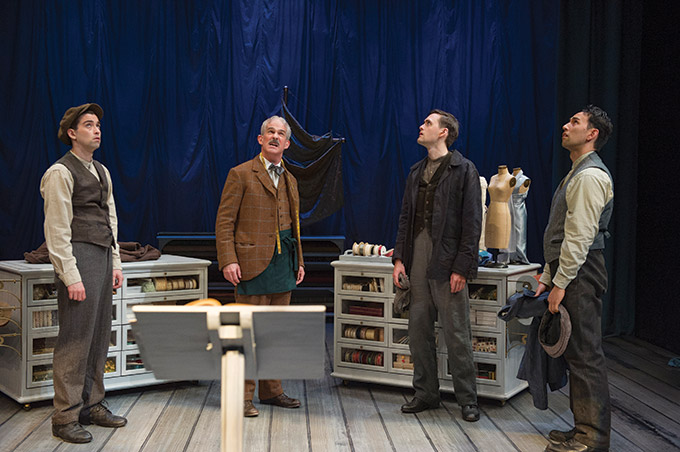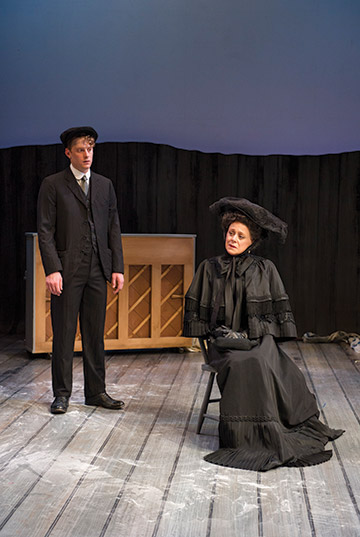The Sea at the Shaw
by Anthony Chase


Like Anton Chekhov, Edward Bond insists that he writes comedies, but he speaks with a voice imbued with all the seriousness of grand tragedy. He emerged as a major English playwright during the 1970s, with a series of powerful and thought provoking plays staged at London’s Royal Court—a theater famous for challenging contemporary social norms. With a mandate expanded to include “plays that share [George Bernard] Shaw’s provocative exploration of society and celebration of humanity,” it was only a matter of time before the Shaw Festival arrived at the work of Edward Bond. His 1973 masterwork, The Sea, is a perfect fit for the Shaw vision.
In The Sea, two young men on a small boat are caught in a violent storm. One man dies at sea, while the other, Willy Carson, makes his way safely to shore. On land, he meets the fiancée of his lost friend and her tyrannical aunt, Mrs. Rafi.
The year is 1907, and Willy quickly learns that the fabric of this small village on the East Coast of England is fragile. The tenuous equilibrium of this perfectly ordered place has been profoundly disturbed by the death of his friend, and the fraying threads of that order become apparent as the people wait for the body of the lost man to wash ashore.
The play gives us one of the 20th century’s iconic female characters in tyrannical Mrs. Rafi. The character, first created by Coral Browne, has also been played by Judi Dench, and Eileen Atkins. The Shaw Festival production boasts one of the truly great Canadian actresses, Fiona Reid, as this tyrannical and overbearing woman, half small town Queen Victoria, half Lady Bracknell, who deploys her power as self-appointed arbiter of all conduct to keep everyone in his or her proper place.
“Jessica, stop trying to sound like a woman with an interesting past,” she scolds her companion. “Nothing has ever happened to you. That is a tragedy. But it hardly qualifies you to give advice.”
Reid gives a lusciously generous performance. Marvelously costumed in smart Edwardian clothes by Michael Gianfrancesco, Reid explores every comic and tragic layer and fold in the fiber of a woman whose overblown sense of civic responsibility inspires her to say that she sympathizes with God.
Little violations of the local order disturb Mrs. Rafi deeply. Her tyranny will set the local draper, played with ever escalating derangement by Patrick Galligan, off the deep end. (He is convinced that Willy is the first of an invasion of interplanetary invaders who intend to enslave the townspeople). When her companion, Jessica (played with broad comedy by Patty Jamieson), sings rather too enthusiastically at the funeral ceremony, competitive Mrs. Rafi becomes comically unhinged herself, using the funerary ashes as a weapon.
Directed by Eda Holmes, this production gives us a series of vivid and exquisitely drawn characters as it navigates Bond’s eight beautifully crafted scenes. Reid’s bold and colorful performance as Mrs. Rafi is matched and complimented by a subdued and achingly sensitive performance by excellent Wade Bogert-O’Brien as Willy Carson. Julia Course gives a lovely and thoughtful performance as grieving and lonely Rose.
Gianfrancesco’s costumes are matched by Camellia Koo’s inspired set design, which takes Bond’s metaphor of fabric to wrap up the entire narrative—from billowing curtains to represent a storm, to unfurling fabric to represent incoming waves—all played upon the economical graying boardwalk of this seaside village.
The challenge of Bond is always one of calibration. How far does one dare push the comedy? At times this production pushes very hard, indeed. Only in the scene of the amateur theatricals, in which Mrs. Rafi directs her fellow citizens in a play while assuming the leading role, did I worry we had lost our way.
By contrast, after the intermission, as the play geared up to its conclusion with three successive and contrasting monologues spoken to Willy, I found myself breathless with the thrill of great playwriting and acting.
Individually, Mrs. Rafi, Rose, and Evens (Peter Millard), the local philosopher, expose their surprising inner thoughts to Willy.
Mrs. Rafi admits her fear of the future and her hopes for her niece. “I’ll grow old and shout at them from a wheel-chair. That’s what they’re waiting for. They get their own back for all the years I bullied them.”
Rose delivers her blistering critique of her aunt, unaware of the way in which the older woman has manipulated her niece’s salvation.
Evens, the man actually hired by the community to keep watch over the town and its shore—as opposed to the presumed authority of Mrs. Rafi—reveals his complicated relationship to the village and its population. Millard’s performance is notable and remarkable for giving us a sense of the fuller life of Evens—an impressive feat, and one I would not have predicted from seeing the character on the printed page.
While these speeches contradict each other, each expresses remarkable and eloquent truths. And Mr. Bogert-O’Brien, an actor who brings distinctive eloquence even to silence, listens exquisitely. His ultimate escape from this lost English village is enormously satisfying. At the conclusion of this beautiful play, we feel the thrill of a bird released from a cage.
|
Issue Navigation> Issue Index > v13n35 (Week of Thursday, August 28) > The Sea at the Shaw This Week's Issue • Artvoice Daily • Artvoice TV • Events Calendar • Classifieds |









 Current Issue
Current Issue